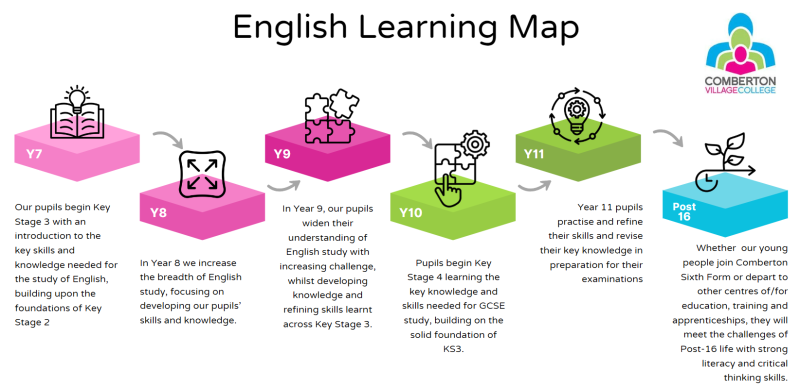All pupils study English Language and English Literature from Years 7 to 11.
English is both a subject in its own right and the medium for teaching; at its simplest it is the study of, and practise of the skills related to, of reading, writing, speaking and listening. We believe that English is the subject where young people find their identities and learn to give expression to it – our teaching guides them to do that.
Reading
Pupils learn to decode text and to understand both the surface layer meanings and those more complex that lie beneath, unpicking layers of meaning to consider how a writer uses their craft to create meaning. We teach pupils a range of texts from the English literary canon in balance with diverse global texts, reflecting our pupils’ own worlds as well as the wider world around them. In their English lessons we hope that our pupils learn to love books: we aim to set the foundation for each of them to become confident and enthusiastic adult readers.
Writing
From Year 7 our students are taught the value of technical accuracy in their spelling, punctuation and grammar. As they progress through KS3 and into KS4, our pupils learn how to use these skills to shape their writing and control the meaning of what they wish to communicate. We teach writing in all its forms, both the writing that will prepare them for life beyond school (formal letters, articles, speeches etc) and creative writing for pleasure and to encourage their own self-expression and personal development.
Speaking and Listening
Our pupils’ voices must be heard in the classroom, it essential to the teaching of English. We encourage oracy as a tool for not only communicating ideas with clarity, accuracy, and effect but also to develop their thinking in our subject.

Year 7 English
Why do we teach what we teach?
Year Seven English is all about giving our students an introduction to English at secondary school. Our students join us from a wide range of primary schools and will all have had different experiences of English at KS2. We aim to build on the skills they have acquired, whatever they have studied and introduce them to KS3 skills systematically, growing their reading, writing and oracy ‘toolkits’ through the year, whilst exposing them to a wide range of ideas and texts to grow their knowledge.
Group changes
Students are taught in tutor groups for the first half term of Year 7 and are then organised into broad ability groupings based on data collected, KS2 information from the primary schools and teacher assessment. Students are organised into mixed ability groups on the whole, with some smaller groups for identified students who will benefit from additional support. Groupings are flexible and will be revised through the year to ensure that students are suitably placed. All groups follow the same broad curriculum, ensuring absolute equality of opportunity for all our students, in line with our comprehensive ethos, which enables all our students to access our full curriculum offer.
Year 8 English
Why do we teach what we teach?
Year Eight English is all about building upon the skills that have been taught, practised and developed in year seven, whilst introducing new ones (such as broadening their understanding of a writer’s methods, such as looking at stagecraft in the study of Shakespeare). We also introduce our students to a broad range of new knowledge expanding their understanding of the English literary heritage as well as the world around them through the study of non-fiction texts.
Year 9 English
Why do we teach what we teach?
Year Nine English is all about honing the skills that have been taught, practised, and developed across KS3 so far, whilst developing the complexity of their thinking about texts, writing and communication skills. Through a broad and diverse curriculum introducing our students to a wide range of new knowledge, such as the role language plays in society and how and why texts are carefully and consciously constructed by writers.
Please see our Key Stage 3 Curriculum Guide for information on the specific topics taught each term.
What is GCSE English?
GCSE English is a two-year course which leads to two qualifications: GCSE English Language and GCSE English Literature.
GCSE English Language allows students to demonstrate their ability to:
GCSE English Literature requires pupils to explore texts from a personal perspective and offers an experience of:
All work is assessed in terminal exams at the end of year 11, two each for GCSE English Language and GCSE English Literature.
The Exam Syllabuses
Further information about the courses can be found on the AQA website:
http://www.aqa.org.uk/subjects/english/gcse
Please see our Key Stage 4 Curriculum Guide for information on the specific topics taught each term.
Contact Information
For subject-specific enquiries, please see the contact information below.
For queries related to book purchasing, school trips or other administrative matters, please contact the department administrator, Ms Pinder: npinder@combertonvc.org
For queries related to lessons or homework, please contact the relevant class teacher.
For all matters related to literacy and literacy support and interventions please contact the school’s literacy coordinators, Mr Law and Ms Seagrove: rlaw@combertonvc.org tseagrove@combertonvc.org
For queries related to general English matters at years 7, 8 and 9 please contact the Key Stage 3 Coordinators, Miss Richards and Mrs Stanley: irichards@combertonvc.org kstanley@combertonvc.org
For queries related to general English matters at years 10 and 11 please contact the Key Stage 4 Coordinator, Mr Shelley: oshelley@combertonvc.org
For all other queries please email the Head of Department, Ms Hillman: jhillman@combertonvc.org
If you would like to view related Key Stage 5 courses, please click the links below: